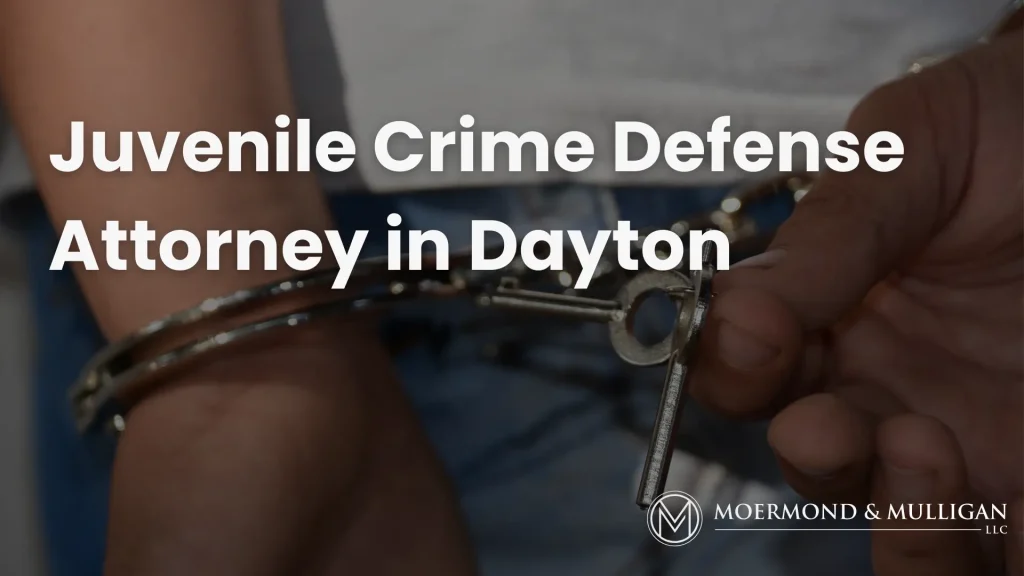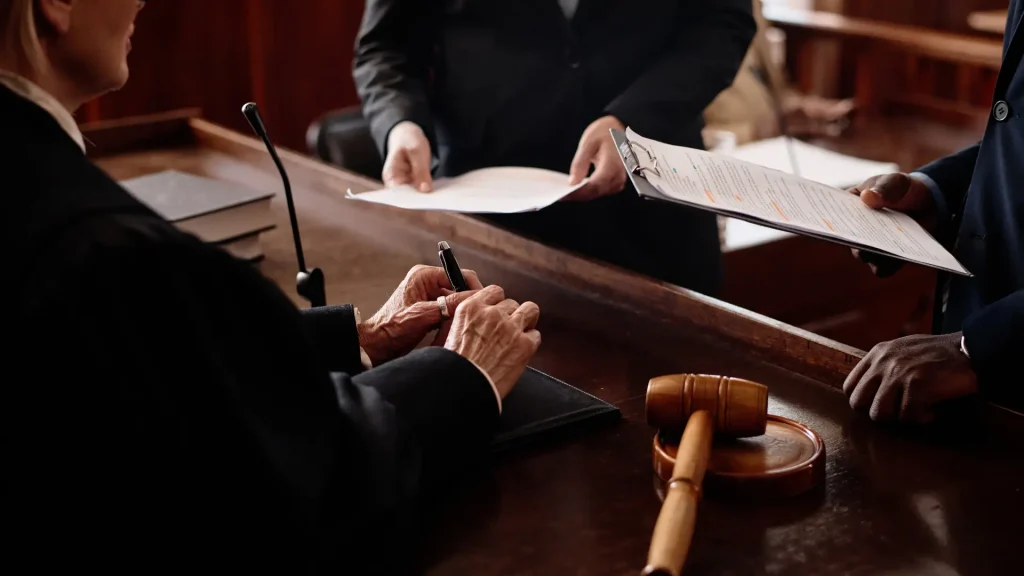
Kids can be irresponsible, and sometimes, that irresponsibility lands them in a situation where they have to go to court. If your child has been charged with a juvenile crime or is labeled a delinquent child, this may lead to issues related to juvenile delinquency. It is important you take proactive steps to protect their rights and defend against the charges. A juvenile conviction in Ohio can drastically change your child’s life and impact their education, future employment, and wellbeing. Hire a juvenile crime lawyer in Dayton to get the justice you deserve.
The attorneys at Moermond & Mulligan, LLC have over 50 years of collective experience as criminal defense attorneys and have a proven track record in managing juvenile criminal cases and in providing effective legal representation. in Dayton and Ohio. Even with good parenting and good schools, children sometimes make mistakes, and one mistake shouldn’t ruin their lives. We can defend your child’s rights and manage their case in a way that protects their privacy and future prospects.
Contact us online or call Moermond & Mulligan, LLC today at (937) 228-9790 to speak to a juvenile crimes attorney for legal representation in Dayton.
Differences Between Ohio’s Juvenile and Adult Criminal Systems
In Ohio, when a minor (a person under the age of 18) commits a misdemeanor or felony offense, they will go through the juvenile justice system. The juvenile justice system in Ohio differs from the adult justice system, in that minors do not receive the same constitutional protections. This highlights the broader context of the Ohio criminal justice system in key ways related to its purpose and the processes it uses.
Rehabilitation vs. Punishment
The adult justice system in Ohio focuses on punishment and deterrence. Punishments such as confinement and probation serve to punish offenders for bad behavior and disincentivize further law-breaking, including the use of detention centers. Imprisonment in the adult system also functions to separate dangerous individuals from the general population.
The focus of the juvenile system is rehabilitation, which involves rehabilitating offenders effectively. The goal of the system is to rehabilitate juvenile offenders who commit crimes so they become law-abiding adults. so they become law-abiding adults. To that end, juvenile systems focus more on fostering change and development and creating roads to a productive future.
Adjudication vs. Guilt
Technically, in Ohio, minors in the juvenile system are not guilty of crimes. When a court determines a minor has committed an offense, they will designate the minor as an adjudicated delinquent, not a guilty criminal. This means adjudicated minors in Ohio do NOT have criminal convictions or criminal records, although adjudication can affect a minor’s employment or education prospects. This difference in terminology between guilty and adjudication reflects the juvenile system’s emphasis on providing constitutional protections for those involved in a juvenile offense . on rehabilitation and reform rather than punishment.
No Jury
Juvenile offenders are not entitled to a jury of their peers like adult offenders. Instead, a judge or magistrate hears juvenile cases and decides them based on evidence and their judgment. Similarly, minors in Ohio do not undergo a trial and instead have an adjudication hearing. Grand juries also do not exist in juvenile cases, and law enforcement and the prosecutor instead bring the charges, while the law enforcement officer gathers evidence.
Parents’ Role
Given their role in shaping children’s environment, behavior, and values, parents and families play a key role in the juvenile justice system. Juvenile cases not only concern the individual child but also their family and home life. Attorneys will discuss possible defense strategies with parents and be present at court hearings.
Common Juvenile Crimes
Juveniles sometimes commit violent crimes, like rape or murder, but these serious felonies make up a small minority of juvenile cases. Most juvenile crimes in Dayton consist of less serious offenses, such as these various types of criminal offense:
- Simple assault
- Possession of alcohol/drugs
- Underage driving
- Disorderly conduct
- Truancy
- Theft and shoplifting
- Traffic violations
- Vandalism
However, some juveniles can become involved in serious offenses, including these delinquent acts:
In Dayton specifically, police have noted increased rates of juvenile offenses such as gun crime, motor vehicle theft, menacing, and stealing property can lead to placement in a detention facility.
Punishments for Juvenile Crimes
Another major aspect where the juvenile and adult justice systems differ is the penalty for offenses. Juvenile crimes do not involve incarceration in correctional facilities, and punishment favors more constructive solutions, such as a diversion program. Other solutions include:
- Community service
- Administrative suspensions (e.g., driver’s license)
- Psychological counseling
- Drugs/alcohol testing
- Community control (e.g., probation)
- Placement in temporary custody
- House arrest
- Educational attendance requirements
- Fines and court costs
- Curfew imposition
- Detention in a juvenile facility
Courts will decide an adjudicated minor’s sentence at a dispositional hearing. The judge will consider several factors when determining the appropriate punishment, such as previous offenses, the presence of remorse, the minor’s home life, and their conduct during proceedings.
Serious Youth Offender Designation in Ohio
In 2002, Ohio introduced legislation creating the serious youthful offender (SYO) designation and applicable sentencing rules (ORC 2152.13). SYO sentencing is sometimes called a blended sentence and is reserved for youths who commit certain violent offenses while having a previously adjudicated delinquency. Youths under SYO sentencing rules are not tried in adult courts, but their sentencing can involve elements of juvenile and adult sentences. Very often, the form of this punishment is an adult sentence that is stayed until the minor completes their juvenile disposition.
In order for SYO sentencing rules to apply, the offender must be at least ten years old, and one of the following must be true, particularly in cases involving an unruly child :
- The offender committed an act of violence.
- The offender used or displayed a firearm while committing the act.
- The youth offender has a previous commitment to a Department of Youth Services facility.
Why You Should Hire a Juvenile Crimes Attorney
Ohio’s juvenile system focuses on rehabilitating offenders, but that does not mean that juvenile record is not a serious matter and doesn’t have negative impacts on your child’s life. Aside from the immediate punishment and penalties, juvenile offenders can face long-term consequences, including the need for medical or psychological treatment. Juvenile proceedings can disrupt your child’s education, and depending on the offense, juvenile offenders may have difficulty receiving financial aid for school. They can lose driving privileges and become socially ostracized by their peers. Studies have also shown that children who interact significantly with the juvenile justice system are more likely to re-offend and have worse life outcomes than those who do not.
A juvenile defense attorney can meet these challenges and protect your child’s rights while mitigating the worst of the consequences of an adjudication. Vulnerable minors need legal protection more than most, and our firm’s legal team can provide the support you and your family need to handle through difficult circumstances to navigate through difficult circumstances. We can investigate your child’s case and represent them in juvenile proceedings to secure an outcome most favorable to their wellbeing. Our Dayton juvenile crime lawyer believes in second chances, and a single mistake should not irreparably damage a child’s life.
Juvenile Crime in Dayton FAQ
Below are some of the most common questions we receive about juvenile crimes and the juvenile criminal system in Dayton and Ohio.
Do Juvenile Convictions Show Up on Background Checks?
Sometimes. Juvenile adjudications are technically not criminal convictions, and so are not on the public record of the court. However, specific juvenile convictions, especially those that mark a juvenile delinquent for certain offenses, can show up on background checks. Violent offenses can show up on background checks for certain types of employment, especially those that require clearance from a detention center. Specifically, juvenile offenses related to murder, aggravated murder, and registration-eligible sex crimes will appear on Ohio Bureau of Criminal Investigations (BCI) background checks.
Can You Expunge Juvenile Convictions?
Yes, you can expunge juvenile records. First, you must request the court seal the records. Unlike in adult courts, sealing a juvenile record is not the same as expunging it. To seal a juvenile record, you must first wait at least six months after the adjudication or until the offender is 18. After that, you can apply to seal the records and attend a hearing where a judge will decide, which is part of effective criminal defense. Once a juvenile record is sealed, it will automatically become expunged after five years or when the offender turns 23, whichever is first. Expunged juvenile records are effectively permanently irretrievable and should not show up on background checks.
Can Juveniles Be Charged As Adults in Ohio?
Yes, juvenile courts may transfer a minor’s case to an adult court for specific crimes, mostly felony offenses. Trying a minor as an adult is mandatory when the offense is aggravated murder, and the minor is at least 16, or the child is at least 14 and has a previous adjudication for a juvenile felony offense (ORC 2152.12). Courts can also have discretion to try minors older than 14 as adults for serious felony offenses.
If a juvenile is tried in an adult court, they can be subjected to the same adult penalties, such as jail time in an adult facility and probation. If your child is facing a charge in an adult court, it is imperative you speak to a Dayton juvenile crime attorney to discuss defense strategies.
Contact a Juvenile Crime Defense Attorney in Dayton
Juvenile crimes are a serious matter and warrant a similarly serious response. If your child is currently subject to underage criminal charges, time is of the essence. Without an attorney to assist, the state might subject your child to the maximum punishment, which can have innumerable detrimental effects. The attorneys at Moermond & Mulligan, LLC are experienced in handling Ohio’s juvenile justice system and providing robust criminal defense and can stand firmly beside you and your family to offer our guidance and protection, ensuring you achieve the best outcome for your child’s case.
Don’t try to handle your child’s case on your own or trust your luck to a public defender, our team can help. Contact our office online or call (937) 228-9790 today for a free consultation, no-obligation case consultation with a juvenile crime attorney in Dayton. We can help your child get the justice you deserve.

Last Updated: 09-16-2025